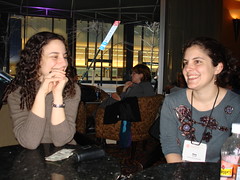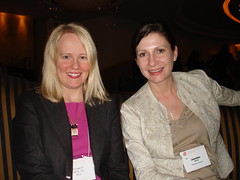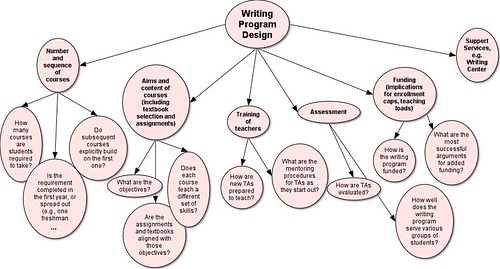Day 3 of CCCC...I've been so busy up to this point. The old tootsies are killing me, what with doing all the walking -- even in comfortable shoes with insoles.
So what have I been doing? On Wednesday, I was doing some work in the morning and then went to the Intellectual Property Caucus. I took notes on it, and I'll pull these together and post them, but it probably won't be until next weekend. I have to go to New Jersey for MediaCommons-related stuff, and after I get back on Tuesday, tons of teaching-related work to do.
On Thursday, I had my session. I can never go to other sessions before mine on the day I present -- apologies to Mike, whose panel was right before mine. I don't know why, except to say that I want to focus for a while before my presentation. My session went okay, for the most part; at the beginning, we were trying to prod the previous presenters out, and one of them didn't seem to want to leave the podium, where she was answering questions. Then there were other technological stumbles that set us back. As a result, we started at 1:51 -- six minutes late. I looked at the time right before and right after my talk, and my presentation went from 1:52 to 2:12. I'm pretty good at cutting my presentations on the fly, but I thought I'd planned my talk to go under time anyway, so I didn't. But I should have, especially given the late start.
We ended up not having any time for questions, which is bad. I hope everyone who had burning questions, at least questions for me, was able to talk to me after the session.
After my session, I got together with some Minnesota people:


Then I went back to my room and watched Take 20: Teaching Writing: the documentary film in which 22 rhetoric and composition scholars and teachers are asked twenty questions about teaching writing. As one would expect, it's a valuable resource. The highlights for me were the stories people told of their first semesters as new teachers, as well as the repetition of the same answers when they were asked the following three questions:
"If you had to pick only one book for a writing teacher to read, what would it be?" [one popular answer: Pedagogy of the Oppressed]
"If you had to pick only one essay for a writing teacher to read, what would it be?" [one popular answer: "Inventing the University"]
"If you had to pick only one scholar for a writing teacher to read, who would it be?" [one popular answer: Peter Elbow]
Of course, I also have some criticisms, particularly on the issue of camera time: David Bartolomae, Erika Lindemann, and Nancy Sommers seemed to get more camera time than the others, and Howard Tinberg and Paul Kei Matsuda seemed to get less. I know editing decisions are difficult, but I wonder if Todd Taylor went through the final edit and timed each person's appearances in the film.
Another point about the film (and I hate to end on a somewhat cynical note): three questions I would have liked to hear answered are:
1. Are you teaching a first-year composition course this semester?
2. Did you teach a first-year composition course last semester?
3. When was the last time you taught a first-year composition course? [Or: how often do you teach first-year composition? This issue is one reason I wanted far more Tinberg in the film. Another reason, obviously, is community college representation.]
It's quite possible that I would have been pleasantly surprised by the answers. I wish I could have had the opportunity to be.






